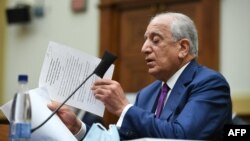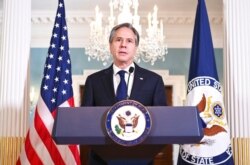The top U.S. envoy to Afghanistan, Zalmay Khalilzad, is stepping down from his post, less than two months after the chaotic U.S. withdrawal from Afghanistan.
U.S. Secretary of State Antony Blinken announced Khalilzad's departure in a statement Monday evening, saying the envoy would be replaced by his deputy, Thomas West.
"I extend my gratitude for his decades of service to the American people," Blinken said.
Khalilzad had been the U.S. special envoy for Afghanistan for the past three years, serving under both President Joe Biden and former President Donald Trump.
Before that, he had served as the U.S. ambassador to the United Nations, Iraq and Afghanistan under former President George W. Bush.
Khalilzad, who was born in Afghanistan, has faced criticism for his role leading negotiations with the Taliban and the Afghan government beginning in 2018.
Khalilzad failed to broker a power-sharing government between the two sides but did negotiate an agreement between the Taliban and the United States in February 2020, which led to the U.S. military withdrawal from Afghanistan.
As U.S. forces withdrew from the country this year, Taliban forces rapidly took over cities across Afghanistan, leading to the fall of the U.S-backed government in Kabul in August.
The speed of the Taliban takeover contributed to a chaotic U.S. military withdrawal from Afghanistan in which hundreds of U.S. citizens and thousands of Afghans who helped the U.S. war effort scrambled to leave the country in the final days of the U.S. military operation.
In a letter to Blinken, Khalilzad acknowledged that he was not able to broker a power-sharing government between the Taliban and the U.S-backed government in Kabul.
"The political arrangement between the Afghan government and the Taliban did not go forward as envisaged," he wrote.
"The reasons for this are too complex and I will share my thoughts in the coming day and weeks," he added.
However, Khalilzad defended the deal he brokered between the United States and the Taliban. He argued it was not faults in the agreement that led to the Taliban takeover of Afghanistan, but decisions by both the Trump and Biden administrations to withdraw from the country despite the Taliban's failure to comply with many aspects of the deal.
He wrote that the Taliban "agreed to negotiate directly with the existing Afghan government for a power sharing agreement and a comprehensive and permanent ceasefire," along with pledging not to carry out attacks on U.S. forces and not to support terrorists.
As part of the agreement, the United States "agreed to withdraw our forces in phases over a 14-month period if the Taliban implemented their commitments," he said.
Khalilzad said in his letter that "now is the right time" to step down from his post, saying the United States is "at a juncture when we are entering a new phase in our Afghanistan policy."
Khalilzad, a former Colombia University professor, entered the U.S. government during the Carter administration, when the United States was beginning its support for Afghan mujahedeen fighters battling Soviet forces that occupied Afghanistan.
His replacement, West, is a longtime aide to Biden, having served on Biden's national security team when he was vice president.
Nike Ching at the State Department contributed to this report. Some information also came from the Associated Press and Agence France-Presse.







